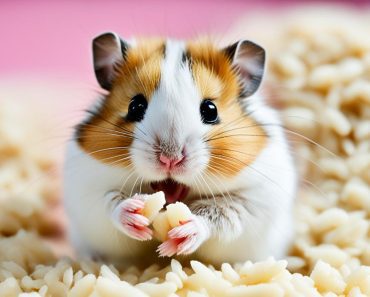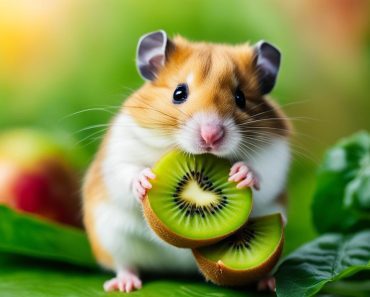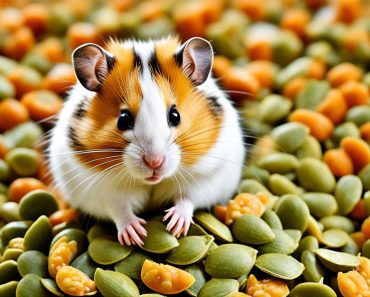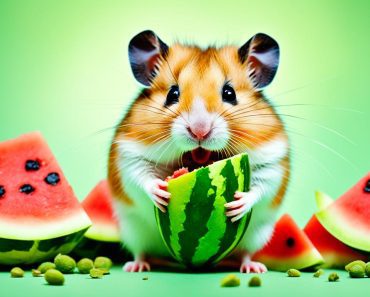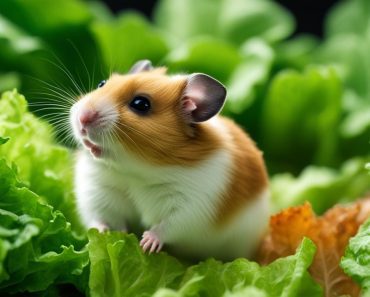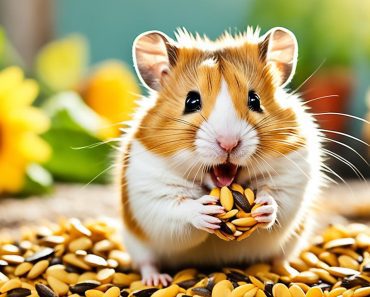Hi, I’m here to answer an important question for all the hamster owners out there: Can hamsters eat oranges? As cute and fuzzy as these little creatures are, it’s crucial to provide them with a safe and nutritious diet. When it comes to citrus fruits like oranges, the answer is a resounding no.
Feeding oranges to hamsters can lead to stomach distress and diarrhea due to their high acidity. Citrus fruits, including oranges, tangerines, lemons, and grapefruits, should be avoided altogether to prevent any potential harm to your furry friend.
So, what should you feed your hamster instead? Stick to a proper hamster diet, which consists of hamster mix that includes pellets, cracked corn, grains, and seeds. It’s important to choose mixes without additives and artificial colors to ensure the best nutrition for your pet.
Along with hamster mix, you can occasionally offer fresh fruits and vegetables as a treat. But remember to choose carefully and in moderation. Safe options include apples, carrots, squash, blueberries, strawberries, celery, lettuce, melon, cherries, banana, and mango. These should be rinsed and dried before giving them to your hamster, and it’s essential to introduce new foods gradually to avoid any tummy discomfort.
When it comes to feeding your hamster, it’s crucial to prioritize their health and well-being. That means being aware of the potential risks of certain foods, like oranges, and making informed choices for their diet.
Can Hamsters Eat Oranges? No, it is better not to take the chance.
- Hamsters should not be fed oranges or any other citrus fruits due to their high acidity and potential to cause stomach distress.
- Stick to a balanced hamster diet consisting of hamster mix, which includes pellets, cracked corn, grains, and seeds, without additives or artificial colors.
- Occasionally offer fresh fruits and vegetables as treats, such as apples, carrots, squash, blueberries, strawberries, celery, lettuce, melon, cherries, banana, and mango, in limited quantities.
- Remember to rinse and dry fresh foods before giving them to your hamster, and introduce new foods gradually to avoid any tummy discomfort.
- Ensure your hamster has access to fresh water daily and avoid feeding them potentially hazardous foods like sweets, chocolate, rhubarb, raw potato, onions, garlic, pickles, and eggplant.
Hamster Nutrition and Diet Recommendations
When it comes to keeping your hamster healthy, nutrition plays a crucial role. The ASPCA recommends providing hamsters with a balanced diet that includes a quality hamster mix along with occasional fresh foods. Let’s explore the key components of a hamster’s diet to ensure optimal nutrition.
Hamster Mix
A hamster mix serves as the staple food for your furry friend. Look for a high-quality mix that contains pellets, cracked corn, grains, and seeds. It is important to choose mixes without additives and artificial colors, as these can be harmful to your hamster’s health.
Fresh Foods
In addition to hamster mix, fresh foods can be given to supplement your hamster’s diet. Certain fruits and vegetables provide essential nutrients and variety to keep your hamster happy. Suitable fruits include apples, melon, cherries, strawberries, banana, and mango. For vegetables, try offering carrots, squash, celery, lettuce, and blueberries. Before giving fresh foods to your hamster, make sure to rinse and dry them thoroughly. And remember, new foods should be introduced gradually to avoid any tummy discomfort.
By providing a balanced hamster mix and incorporating fresh foods into their diet, you can ensure your hamster gets the necessary nutrients for a healthy and happy life.
The Risks of Feeding Hamsters Oranges
Feeding oranges to hamsters can pose several risks to their health and well-being. Oranges and other citrus fruits are known for their high acidity, which can cause tummy distress and diarrhea in hamsters. The acidic nature of citrus fruits can also damage their teeth over time, leading to dental issues.
Furthermore, oranges have a high sugar content, which can be detrimental to a hamster’s health. Consuming too much sugar can contribute to dental problems and even increase the risk of developing diabetes. It’s important to note that hamsters have sensitive digestive systems and are prone to developing health issues when their diet is imbalanced or contains unsuitable foods.
To avoid these potential risks, it is best to refrain from feeding oranges and other citrus fruits to hamsters. Instead, focus on providing them with a balanced and appropriate diet consisting of hamster mix and occasional fresh fruits and vegetables that are safe for them to consume.
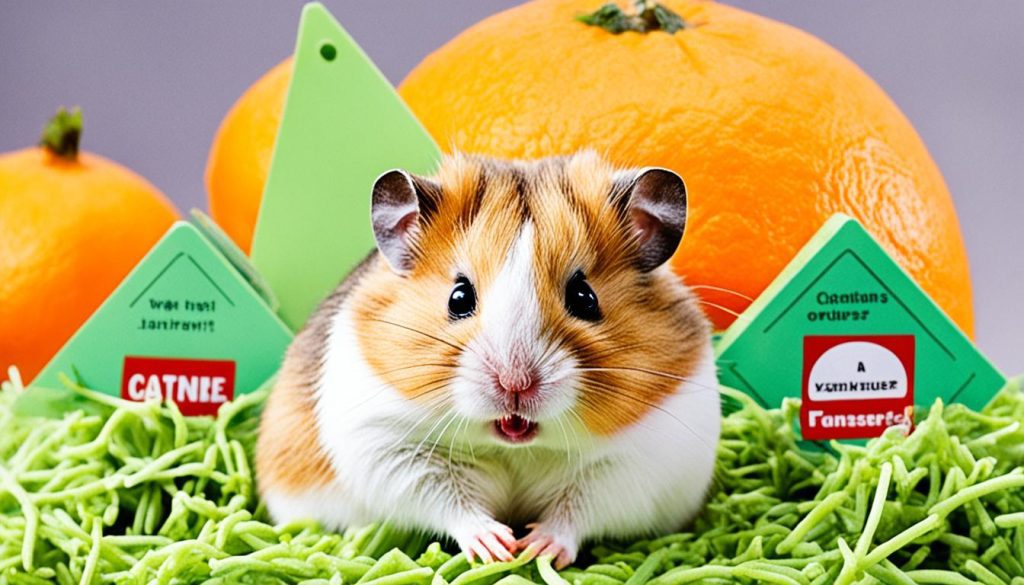
Remember, the well-being of your furry friend should always be a top priority, and understanding the potential risks associated with certain foods is crucial in ensuring their health and happiness.
Potential Benefits and Risks of Oranges for Hamsters
Oranges are widely known for their health benefits in humans, thanks to their rich nutrient profile. They contain essential vitamins such as vitamin C, vitamin A, and vitamin B6, as well as soluble and insoluble fiber. These nutrients contribute to various aspects of human health, including digestive health, eye health, and blood pressure regulation.
However, when it comes to hamsters, oranges carry more risks than benefits. While the nutrients found in oranges can be beneficial for humans, hamsters have different dietary requirements and sensitivities. The high acidity and sugar content in oranges can pose potential risks to the delicate digestive system of hamsters.
Hamsters are susceptible to stomach distress and diarrhea when exposed to high levels of acidity. Additionally, the sugar content in oranges can contribute to dental issues and increase the risk of developing diabetes in hamsters. Therefore, it is best to avoid feeding oranges and other citrus fruits to hamsters.
Instead, hamsters can obtain the necessary nutrients through other safe and suitable foods. A balanced hamster diet consisting of hamster mix, fresh vegetables, and occasional fruits is ideal. There are numerous fruits and vegetables that are safer options for hamsters, including grapes, apples, blueberries, strawberries, watermelon, bananas, pears, and mangoes.
By providing a varied and balanced diet, hamsters can thrive and maintain their health without the potential risks associated with feeding oranges.
Alternative Fruits for Hamsters
While citrus fruits like oranges should be avoided, there are several other fruits that are safe and healthy for hamsters when given in moderation. Some examples include:
- Grapes
- Apples
- Blueberries
- Strawberries
- Watermelon
- Bananas
- Pears
- Mangoes
These fruits provide essential nutrients and antioxidants for hamsters, but it is important to limit their intake due to the high sugar content.
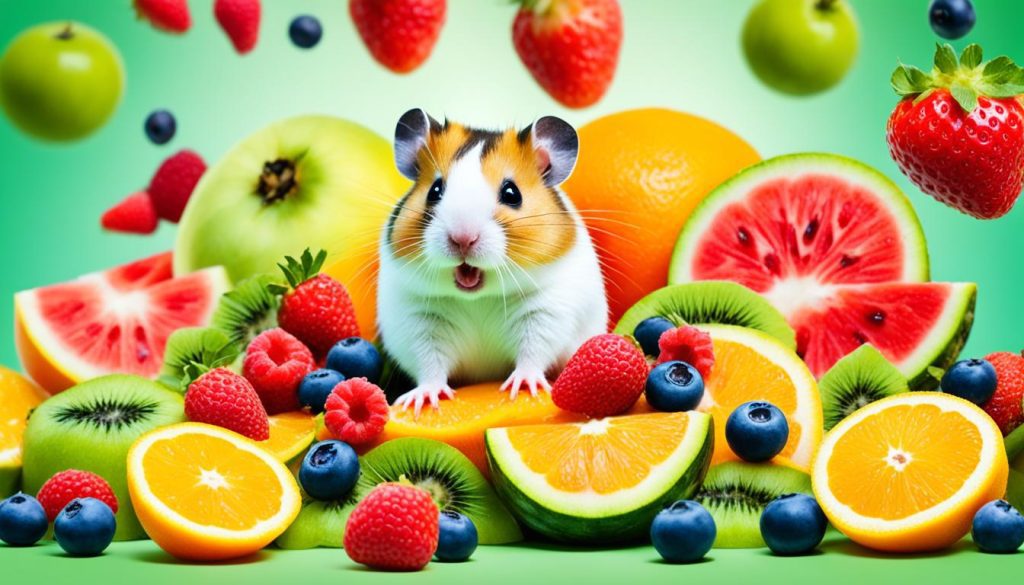
Feeding Guidelines and Tips for Hamsters
When it comes to feeding our furry friends, hamsters, it’s important to follow certain guidelines to ensure their health and well-being. Here are some helpful tips to keep in mind:
- Provide fresh and clean fruits to hamsters in moderation. While fresh fruits are a great source of nutrients, it’s important not to overfeed them. Limit their fruit intake to three or four times a week to prevent any potential digestive issues.
- Remove any uneaten fruit after 24 hours. Leaving uneaten fruit in the cage for too long can lead to stomach problems for hamsters. Always ensure their food is fresh and remove any leftovers to maintain cleanliness.
- Ensure fresh water is always available. Hamsters need access to clean water throughout the day. Provide them with a water bottle and check it daily for cleanliness and leaks.
- Be aware of potential food hazards for hamsters. Avoid feeding them any potentially harmful foods such as sweets, chocolate, rhubarb, raw potato, onions, garlic, pickles, and eggplant. These foods can cause health issues for hamsters.
By following these feeding guidelines and tips, you can provide your hamster with a balanced and healthy diet. Remember to prioritize fresh and clean fruits, remove uneaten food, provide fresh water, and avoid any potential food hazards. Your furry friend will thank you for it!
Conclusion
It is important to prioritize the safety and well-being of our pet hamsters when it comes to their diet. Oranges and other citrus fruits should be avoided due to their high acidity and sugar content, which can cause stomach distress and lead to potential health issues.
Instead, we should focus on providing a balanced diet for our hamsters, which includes a quality hamster mix as the staple food and occasional fresh fruits and vegetables. Safe fruits for hamsters include grapes, apples, blueberries, strawberries, watermelon, bananas, pears, and mangoes. However, it is crucial to feed these fruits in moderation to prevent excessive sugar intake.
By following the recommended feeding guidelines and avoiding potentially harmful foods, we can ensure that our hamsters receive the necessary nutrients without compromising their health. Remember, the key is to prioritize their well-being and provide them with a safe and suitable diet.

